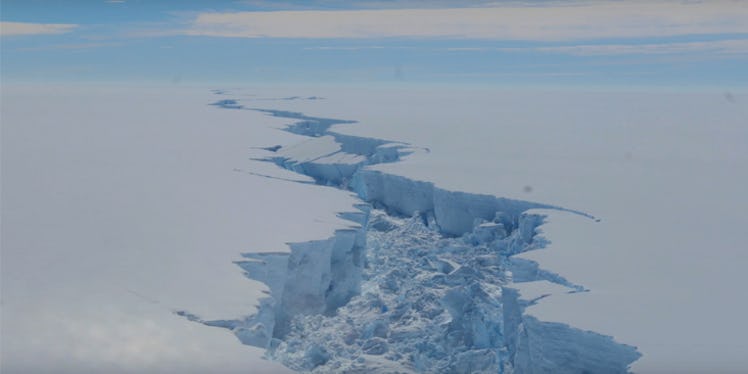
A Gigantic Iceberg Just Broke Off Antarctica, So That's Pretty Unsettling
A gigantic iceberg has officially broken away from Antartica's fourth largest ice shelf, scientists and NASA's Aqua MODIS satellite have confirmed.
The vulnerable chunk of ice reportedly weighs more than 1 trillion tons and measures a concerning 5,800 square kilometers (about 2,239 square miles).
Though scientists have been expecting its latest move — which reportedly occurred sometime between Monday, July 10, and Wednesday, July 12 — for a while now, I'm feeling unsettled by the news.
Swansea University's Professor Adrian Luckman, the lead researcher behind the longstanding UK-based Antarctic Project MIDAS research, explained in a statement that his team has been monitoring significant ice shelf changes over the past year. He said,
We have been anticipating this event for months, and have been surprised how long it took for the rift to break through the final few kilometres of ice. We will continue to monitor both the impact of this calving event on the Larsen C Ice Shelf, and the fate of this huge iceberg.
IDK, but "the fate of this huge iceberg" feels daunting coming from a scientist. He continued,
The iceberg is one of the largest recorded and its future progress is difficult to predict. It may remain in one piece but is more likely to break into fragments. Some of the ice may remain in the area for decades, while parts of the iceberg may drift north into warmer waters.
Other similar incidents on the Larsen A and Larsen B shelves caused a rise in sea level, so that could be problematic in the future, too.
Alas, the Swansea University scientists aren't blaming global warming or climate change just yet.
In the same eye-opening update on the Project MIDAS website, Dr. Martin O'Leary, a glaciologist, clarified that they're "not aware of any link to human-induced climate change."
The team will obviously continue to monitor the situation in Antartica. It's been reported Larsen C could potentially regrow or collapse in the coming years.
Meanwhile, I'm googling everything there is to know about ice shelves and sea levels to prepare for what's to come.